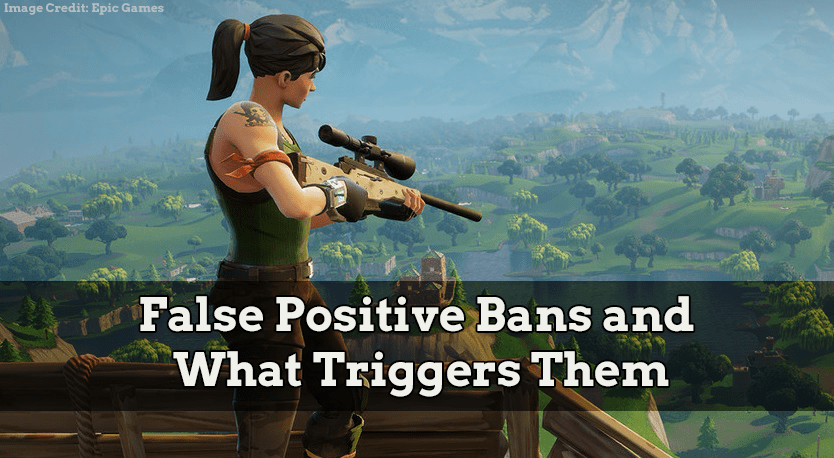False positive bans in video games have been around ever since online gaming became a thing. However, the persistent mystery remains: what exactly sets off these bans?
In this article, we cut through the confusion and reveal the precise factors that can unexpectedly lead to a false ban. And, as a bonus, this applies to any online game.
There are two different types of landing a false ban, namely:
- automated false ban, which is an incorrect detection by the anti-cheating software;
- manual false ban, which is a human mistake, by the gaming company or its employees.
Below, we’ll go through both of them, with real examples for each situation!
We’re here to provide you with the best support in order to get you unbanned!
Get Unbanned!Automated False Bans
There are many different things that can trigger an incorrect detection, but the top 3 most common are:
- false reports;
- login discrepancies;
- gameplay anomalies;
- incorrect anti-cheat detection.
And here’s what each of them means.
False Reports Bans
False reports are an issue in most online games, especially if you’re a popular streamer or player.
Essentially, it’s when a large number of players report you for breaking the rules within a short period of time. This is what happened to Asmongold as well a while back, getting automatically silenced following multiple reports after saying “I love WoW”.
Not every false report is an ill-intended one. I’m sure most players reported someone for landing what seemed to be an impossible headshot or based on their kill cam review. But, that doesn’t mean that player was cheating.
Nonetheless, if multiple reports against you pop up within a short period of time, you’re likely to get muted (silenced), shadowbanned (like in CoD) or even suspended.
This is common to virtually any online game where you can report someone. Here’s another example of it happening, which resulted in a suspension from League of Legends:
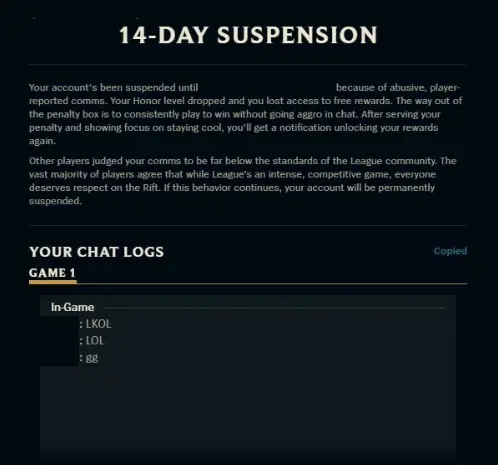
And, the “best part” about false report bans is that there’s nothing you can do to prevent them. If you’re too good at an FPS game, you’re likely getting reported quite a bit.
Then again, not fighting with other players is a great way to decrease the likelihood of getting “revenge reported”. That’s when one player that has a beef with you will ask everyone in the chat to report you for saying/doing something.
On the other hand, false reports bans are quite easy to overturn, especially those for toxicity, where the logs are clearly not bad.
In short:
- false reports cannot be prevented;
- they can happen in any game with a report function;
- are easy to overturn (especially in toxicity cases).
Login Discrepancies Bans
Login discrepancies are another form of false positive bans, where your account gets locked or even banned after logging in from a different location/device. Or, though a VPN.
Having it locked is mostly a security measure to prevent your account from being compromised, and can be solved by just verifying your identity.
Getting banned however is a whole different problem. This also depends on your gameplay during that time.
For example, if you decided to play while on vacation or simply behind a VPN, and you started getting a very good win-streak, you’ll probably be accused of getting boosted. That’s because ranking up fast while playing from a different device/IP is usually how gaming companies “detect” or flag boosting.
And, it won’t be easy to prove otherwise.
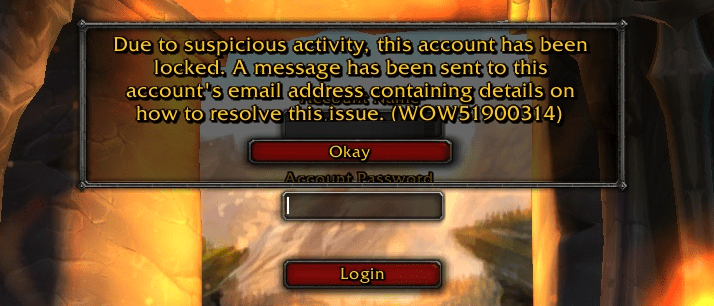
One thing you can do to have some proof of your innocence, is to get a VPN with a static or dedicated IP. That means that no matter where you play from, you’ll have the same exact IP at all times. And, as soon as you get it, contact the game support and let them know about it, if they have an IP whitelisting feature.
Keep in mind though that not all games allow VPN usage. For example, simply playing while behind a VPN will get you banned from Fortnite.
Another thing that can help preventing a false positive ban due to IP discrepancy is to not engage in competitive (ranked) gameplay while traveling or behind a VPN. For example, avoid:
- Arenas or high Mythic+ in WoW;
- ranked games in LoL, Dota 2, Overwatch 2, Apex Legends, Call of Duty, other FPS and Battle Royale games;
- Trials of Osiris in Destiny 2.
Apart from that, there isn’t much to be done in order to prevent a false ban for a location discrepancy.
In short:
- you can’t really prevent an IP discrepancy ban or account lock;
- try to avoid doing competitive or ranked content while traveling or behind a VPN;
- it’s not easy to prove you weren’t getting boosted if you had an unusual win-streak on a different IP or device.
We’re here to guide and assist you in your account recovery process!
Gameplay Anomalies Bans
Device or gameplay anomalies can make you look as if you’re blatantly cheating, without you even realizing what’s going on.
Perhaps the most common situation is the mobile phone’s GPS system anomaly that can lead to getting banned from Pokemon Go. This means that, there’s a chance for a split second during the loading screen, that your phone appears in a completely different region than you currently are in. As a result, you risk getting banned for allegedly spoofing (without you even knowing it happened).
Similarly, there’s been cases of falling through the map in other popular games, such as Fortnite, WoW or PUBG. Sometimes, the system can automatically ban you for triggering certain in-game coordinates that shouldn’t be triggered by a player (unless they’re using some type of no-clip hack).
Another example of an in-game anomaly is when the flashbang or smoke grenade doesn’t properly load on the enemy player’s screen. This can happen in most FPS games and will cause the enemy player to look like a cheater by still shooting at you without an issue all whilst they shouldn’t be able to see anything.
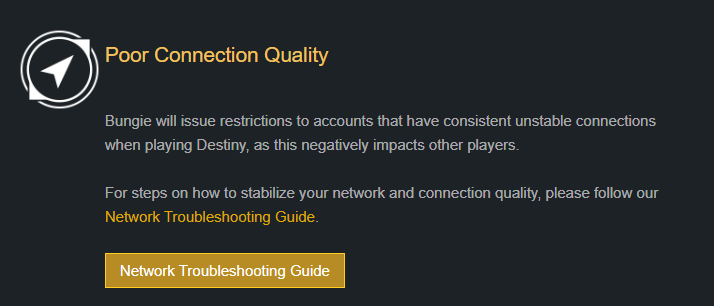
While connectivity isn’t an anomaly per se, there are quite a few games that will ban you for network issues. For example, you can get banned from Destiny 2 for having an unstable internet connection.
However, connectivity issues can trigger an in-game anomaly when you end up teleporting around the place due to the lag being terrible.
In short:
- gameplay anomalies cannot be prevented, and they can happen at any point;
- if you end up under the map or through a wall, keep some evidence (like screen record), just in case you’ll need it;
- if you end up in a badly UI loaded game, leave it and don’t use that to your advantage.
Incorrect Anti-Cheat Detection Bans
Incorrect anti-cheat detections happen when the game’s anti-cheating software, for example EAC or BattlEye, wrongfully detects a certain software as a cheat, despite it not being one.
This type of false positive ban has been around ever since anti-cheating solutions were invented, and while their developers constantly work on improving them, they still fall short sometimes.
Usually, the most “frowned-upon” software is work-related / coding software that can also be used to develop certain cheats or bots. These are, for example, AutoIt or AutoHotKey. Other software that can trigger an incorrect detection ban can be:
- coding, editing, scripting, development, designing, engineering, virtualization, emulation;
- certain less popular antivirus or firewall solutions;
- trainers or mods for other games, including single player ones;
- mouse/keyboard/controller drivers or software;
- video card and other computer parts drivers;
- some operating systems (such as Linux), as well as potential compatibility or emulating required tools (such as Wine);
- network monitoring tools;
- some system optimization tools, such as registry cleaners or system tweakers;
- VPN software, albeit indirectly in some cases, if you land on an IP commonly used by cheaters.
Running them alongside any online game carries a large risk of getting banned, even if you’re not using them in relation to the game.
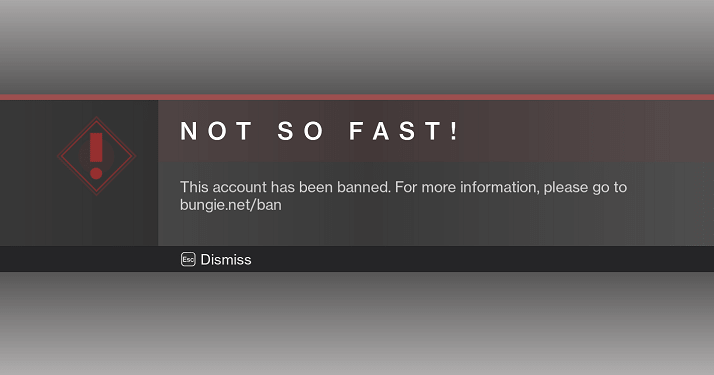
For example, Destiny 2 had quite an issue with overlays such as OBS, Discord, XSplit, GeForce Experience FPS Counter and a few more, which resulted in players getting falsely banned.
On the other hand, Apex Legends had a similar issue with Linux, causing many players with that OS to get banned. Eventually, after a lot of back and forth, those accounts got unbanned from Apex.
Meanwhile, the Overwatch 2 started a thread to try and figure out the cause behind their false positive bans. And here’s one for Apex Legends false bans.
And, not too long ago, one of Counter Strike’s 2 first ban waves was a false positive one, after implementing a new update. They rolled it back though and unbanned the CS 2 affected accounts.
While almost every game had false bans going on, we’ll just mention one more. The Finals, one of the newest FPS games, has too experienced its fair share of false positive bans shortly after release. This happened to both PC and console users, getting their The Finals account banned shortly after starting it, for no apparent reason.

Lastly, here are
In short:
- incorrect detection false bans are only related to the software you’re running;
- you can prevent most of them by not using work, coding, editing, overlay, rendering software alongside your game;
- should be fairly easy to overturn, depending on their nature.
Manual False Positive Bans
Unlike the automated ones, manual false positive bans happen due to a human mistake. The human in this case is either a developer or a support agent / game master.
While some manual false bans are easy to spot and overturn, there are a few situations where it’ll be an uphill battle, to say the least. Here are a few examples.
Boosting False Bans
Imagine playing behind a VPN (or from a different location, while on vacation), and getting on League of Legends to play a few ranked games. You end up with a crazy win-streak, all while playing by yourself, legitimately. If you get reported and manually reviewed by an agent, you’ll likely get banned from LoL for boosting, due to the sudden increase in win-rate, as well as the location discrepancy. It won’t be easy to prove them wrong, unfortunately.
Or, you join a group of people you know from other games for a few M+ carries in WoW. You don’t trade them any in-game gold because they’re your friends, and they want to help you for free. Well, this also looks like boosting, resulting in a WoW ban, and since there’s no in-game gold traded, Blizzard might think you paid them in real-world money. This too won’t be easy to prove, unless your friends don’t really boost other players often.
Real Money Trading (RMT) False Bans
Say your best friend is quitting Lost Ark, and decides to trade or mail you all of their in-game gold. You’re also not talking to them in-game since you’re both on a Discord call. Depending on the volume of gold involved, you might get banned from Lost Ark for RMT, and this too won’t be easy to prove, especially if there are no in-game chat logs to back that up.
Cheating False Bans
Well, if you play Overwatch 2, you must’ve heard of Necros, a popular Twitch streamer and an insanely skilled Genji player. In fact, he’s so skilled that he has, yet again, gotten banned from OW 2, due to “cheating”. This can’t be an incorrect anti-cheat detection, since he was clearly not cheating, but rather a human error when potentially reviewing player reports due to his cutting edge reaction times.
Another similar situation is in FPS or Battle Royale games. Say you’re having your best day in PUBG, landing some unreal shots all while keeping a high K/D ratio. You will get reported, as most good players do, but upon manual review, you might end up banned in PUBG, since some of your shots or flicks might look too good to be true.
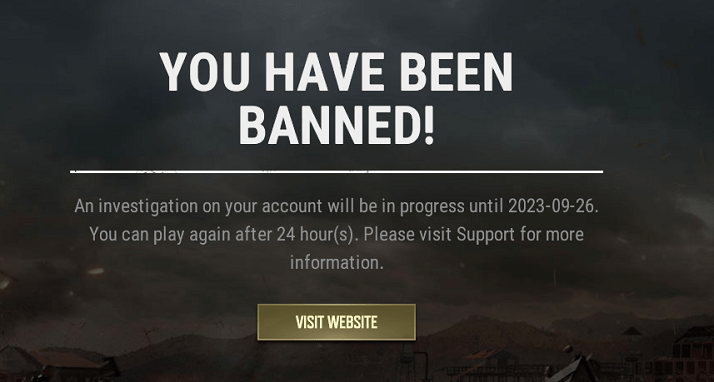
The problem here is that, these bans should be easy to overturn, right? The devs check for any cheating software, and if there’s none, you’re good to go! Well, not always.
You see, not all cheats are detected by the anti-cheating software.
Sure, public and free cheats are almost always detected and banned fast. But, the private, paid and exclusive ones, are much harder to detect, since they’re not available publicly, are frequently updated and very well configured and maintained.
That’s not to say you should try one, as they will eventually be detected and banned. It’s just that it’s possible for a player to cheat, and if done well, the anti-cheating system won’t be able to flag it (at least not right then and there).
Toxicity False Bans
We all know toxicity when we see it. But, there are times where things might be taken out of context, such as saying something that other players will take as “throwing” or “inting”.
On top of that, the agent reviewing the chat logs might be more subjective to some things, or unable to understand the whole context, and might confirm the reports as correctly.
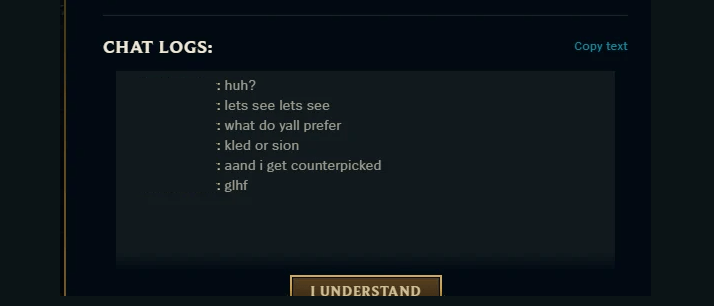
For example, you can end up suspended for toxicity in League of Legends, even if you were not toxic. Now, depending on the logs, it should be fairly easy to have that account unbanned.
But, what if you said something, and even though it’s not toxic or negative, everyone still assumes otherwise?
The best thing to keep in mind here is that, as opposed to face-to-face conversation, there is no tone when chatting online. Words and messages can be interpreted differently, so it’s best to think twice before saying something in-game.
In conclusion, not all false positive bans can be prevented, but now you should be equipped with the relevant information about how to spot one and deal with it! And, as always, if you ever need our help, we’re here for you!
Need Help with a False Positive Ban?
We're here to give you the best help in order to recover your account!
Get unbanned!
